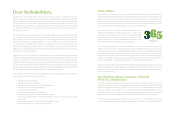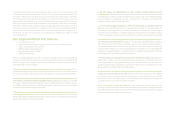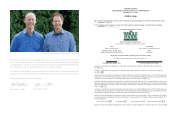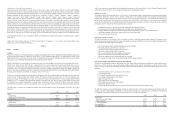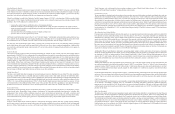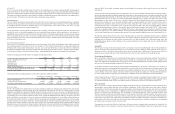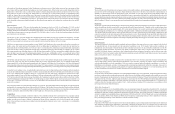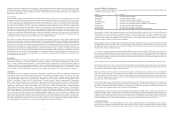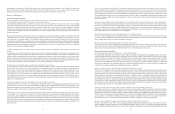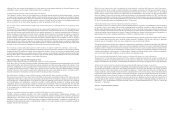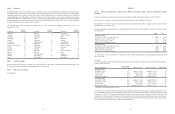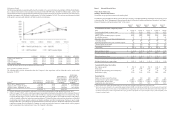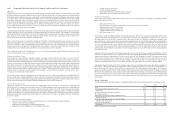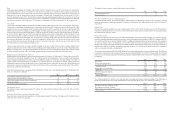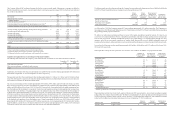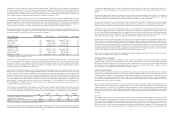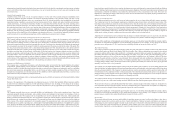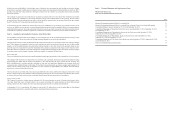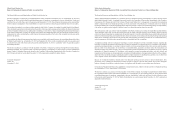Whole Foods 2015 Annual Report Download - page 12
Download and view the complete annual report
Please find page 12 of the 2015 Whole Foods annual report below. You can navigate through the pages in the report by either clicking on the pages listed below, or by using the keyword search tool below to find specific information within the annual report.11
amendments to those reports. We also make available our corporate governance documents, Code of Business Conduct, and
Board of Directors committee charters and policies. We have included our website as an inactive textual reference only.
Information contained on our website is not incorporated by reference into this Report on Form 10-K.
Item 1A. Risk Factors.
Business and Operating Risks
Our growth depends on increasing sales in comparable stores and on new store openings, and our failure to achieve these goals
could negatively impact our results of operations and financial condition.
Our continued growth depends on our ability to increase sales in our comparable stores and open new stores. Our operating
results may be materially impacted by fluctuations in our comparable store sales. Our comparable store sales growth could be
lower than our historical average for many reasons including the impact of new and acquired stores entering into the comparable
store base, the opening of new stores that cannibalize store sales in existing areas, general economic conditions, increased
competition, price changes in response to competitive factors, possible supply shortages, and cycling against any year of above-
average sales results.
Our growth strategy includes opening new stores in existing and new areas and operating those stores successfully. Successful
implementation of this strategy is dependent on finding suitable locations, and we face competition from other retailers for such
sites. There can be no assurance that we will continue to grow through new store openings. We may not be able to open new
stores timely or operate them successfully. Also, we may not be able to successfully hire and train new team members or integrate
those team members into the programs and policies of the Company. We may not be able to adapt our distribution, management
information and other operating systems to adequately supply products to new stores at competitive prices so that we can operate
the stores in a successful and profitable manner.
A failure to maintain the privacy and security of customer-related and business information could damage our reputation and
business.
A compromise of our security systems or those of our business associates that results in our customers’, team members’ or
suppliers’ information being obtained by unauthorized persons or a breach of information security laws and regulations could
adversely affect our reputation with our customers, team members and others, as well as our operations, results of operations,
financial condition and liquidity, and could result in litigation against us or the imposition of penalties. In addition, a security
breach could require that we expend significant additional resources related to remediation, including changes in the information
security systems, and could result in a disruption of our operations, particularly our online business.
Disruptions in our information systems could harm our ability to run our business.
We rely extensively on information systems for point-of-sale processing in our stores, supply chain, financial reporting, human
resources and various other processes and transactions. Our information systems are subject to damage or interruption from
power outages, computer and telecommunications failures, computer viruses, security breaches, including breaches of our
transaction processing or other systems that could result in the compromise of confidential customer data, catastrophic events,
and usage errors by our team members. If our systems are breached, damaged or cease to function properly, we may have to
make significant investments to fix or replace them, suffer interruptions in our operations, and face costly litigation, and our
reputation with our customers may be harmed. Any material interruption in our information systems may have a material adverse
effect on our operating results.
Disruption of significant supplier relationships could negatively affect our business.
United Natural Foods, Inc. (“UNFI”) is our single largest third-party supplier, accounting for approximately 32.0% of our total
purchases in fiscal year 2015. Due to this concentration of purchases from a single third-party supplier, the cancellation of our
distribution arrangement or the disruption, delay or inability of UNFI to deliver product to our stores may materially and adversely
affect our operating results while we establish alternative distribution channels.
Claims under our self-insurance program may differ from our estimates, which could materially impact our results of operations.
The Company uses a combination of insurance and self-insurance plans to provide for the potential liabilities for workers’
compensation, general liability, property insurance, director and officers’ liability insurance, vehicle liability and team member
health care benefits. Liabilities associated with the risks that are retained by the Company are estimated, in part, by considering
historical claims experience, demographic factors, severity factors and other actuarial assumptions. Our results could be materially
impacted by claims and other expenses related to such plans if future occurrences and claims differ from these assumptions and
historical trends.
12
The loss of key management or difficulties recruiting and retaining qualified team members could negatively affect our business.
We are dependent upon a number of key management and other team members. If we were to lose the services of a significant
number of key team members within a short period of time, this could have a material adverse effect on our operations. We do
not maintain key person insurance on any team member. Our continued success also is dependent upon our ability to attract and
retain qualified team members to meet our future growth needs. We face intense competition for qualified team members, many
of whom are subject to offers from competing employers. We may not be able to attract and retain necessary team members to
operate our business.
A loss in consumer confidence in the safety and quality of certain food products could materially impact our results of operations.
We believe our high quality standards differentiate our stores from other supermarkets and enable us to attract and maintain a
broad base of loyal customers. Concerns regarding the quality or safety of our food products or our food supply chain, whether
true or not, could cause consumers to avoid purchasing certain products from us, or to seek alternative food sources. Any report
linking the Company to food contamination, food tampering, mislabeling, or other food safety issues could adversely impact
sales and possibly lead to product liability claims or litigation.
Perishable foods product losses could materially impact our results of operations.
Our stores offer a significant number of perishable products, accounting for approximately 66.5% of our total sales in fiscal year
2015. The Company’s emphasis on perishable products may result in significant product inventory losses in the event of extended
power outages, natural disasters or other catastrophic occurrences.
The loss of store leases could materially impact our results of operations.
Most of our stores are located in high-traffic shopping areas on premier real estate sites, which are leased. We have options to
renew most of our leases in five-year increments. The inability to renew leases or otherwise extend lease terms, could adversely
impact sales or increase operating costs while alternative sites in existing trade areas are secured.
Market and Other External Risks
Increased competition may adversely affect our revenues and profitability.
Our competitors include but are not limited to local, regional, national and international supermarkets, natural food stores,
warehouse membership clubs, online retailers, small specialty stores, farmers’ markets, and restaurants. Their businesses compete
with us for products, customers and locations. In addition, some are expanding more aggressively in offering a range of natural
and organic foods. Some of these competitors may have been in business longer or may have greater financial or marketing
resources than we do and may be able to devote greater resources to sourcing, promoting and selling their products. As competition
in certain areas intensifies, our operating results may be negatively impacted through a loss of sales, reduction in margin from
competitive price changes, and/or greater operating costs such as marketing.
Adverse publicity may reduce our brand value and negatively impact our business.
We believe our Company has built an excellent reputation as a food retailer, socially responsible corporation and employer, and
we believe our continued success depends on our ability to preserve, grow and leverage the value of our brand. Brand value is
based in large part on perceptions of subjective qualities, and even isolated incidents can erode trust and confidence, particularly
if they result in adverse publicity, governmental investigations or litigation, which can negatively impact these perceptions and
our business. We believe that many customers choose to shop our stores because of their interest in health, nutrition and food
safety and that they hold us to a higher food safety standard than other supermarkets. There is increasing governmental scrutiny
of and public awareness regarding food safety. The real or perceived sale of contaminated food products by us could result in
government enforcement action, private litigation, product recalls and other liabilities, the settlement or outcome of which might
have a material adverse effect on our operating results and brand value.
Economic conditions that adversely impact consumer spending could materially impact our business.
Our operating results may be materially impacted by changes in overall economic conditions that impact consumer confidence
and spending, including discretionary spending. Future economic conditions affecting disposable consumer income such as
employment levels, business conditions, changes in housing market conditions, the availability of credit, interest rates, tax rates,
fuel and energy costs, the impact of natural disasters or acts of terrorism, and other matters could reduce consumer spending or
cause consumers to shift their spending to lower-priced competitors. In addition, there can be no assurance that various
governmental activities to stimulate the economy will restore consumer confidence or change spending habits.
Changes in the availability of quality natural and organic products could impact our business.
We source our products from a variety of local, regional, national and international suppliers, and we rely on them to meet our
quality standards and supply products in a timely and efficient manner. There is, however, no assurance that quality natural and
organic products will be available to meet our needs. If other competitors significantly increase their natural and organic product



